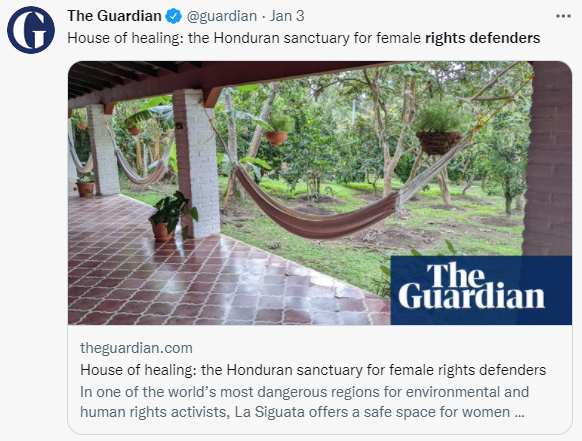
Photo of Rebeca Girón at the La Siguata healing centre in Honduras by Jeff Ernst from his article in The Guardian on La Siguata and La Serena in Mexico.
La Siguata is a healing centre in Tegucigalpa, Honduras for women human rights defenders who are suffering from the trauma of repressive actions against them. It is run by the National Network of Women Human Rights Defenders.
Casa La Serena is another healing centre that is based in Oaxaca, Mexico. Both centres are funded by the Mesoamerican Initiative of Women Human Rights Defenders.
Rebeca Girón of La Siguata in Honduras says: “In the midst of this struggle, we have lost our sisters and our comrades.”
In fact, in La Siguata there is an altar with candles and flowers dedicated to slain Lenca land defender Berta Cáceres who was murdered in 2016 for her opposition to a hydroelectric dam being built without consent on the sacred Gualcarque River.
The altar is also a reminder that Honduras is the country with the highest rate of femicides in Latin America.

Ana María Hernández of Casa La Serena in Mexico notes: “We realised that there was lots of burnout and also strong impacts on women defenders as a result of structural violence, as well as patriarchal violence that was very invisible and normalised.”
She adds: “The very demanding dynamics of women defenders’ activism means that we don’t have time to recover our energies, to connect with our bodies and needs. There is an imbalance between giving and receiving.”
The Guardian explains: “Hernández and colleagues from the Consortium for Parliamentary Dialogue and Equity in Oaxaca developed a holistic approach to help women overcome trauma and recharge, so they can continue their work with renewed vigour.”
It adds: “During their 10-day visits to the centres, women participate in activities from the artistic to the spiritual, in groups and individually, and are given a personalised self-care plan to take home.”
The article further highlights: “In the near future, it is hoped that women from Nicaragua – where the government has brutally repressed dissent, resulting in more than 300 deaths during the wave of protests in 2018 alone – will be able to visit.”
Peace Brigades International works with some of the organizations mentioned in the article including the Mesoamerican Initiative of Women Human Rights Defenders (IM-Defensoras) and the Consortium for Parliamentary Dialogue and Equity in Oaxaca (Consorcio Oaxaca). PBI-Honduras accompanies COPINH, the organization founded by Berta Cáceres. PBI also provides support to Nicaraguan exiles living in Costa Rica.
In 2020, PBI accompanied 54 organizations across our different projects, comprising of 1,803 individuals, 896 of whom are women. That year, 173 PBI volunteers, 77% of whom are women, contributed to our work around the world.
To read the full article in The Guardian, go to House of healing: the Honduran sanctuary for female rights defenders.


